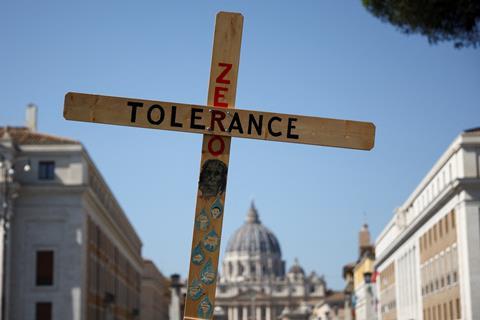It will take more than Justin Welby’s resignation to prevent abuse in the Church, says Susie Leafe. We all need to play our part

Nearly five years ago, in February 2020, I stood to make my final speech at the Church of England’s General Synod.
I hadn’t planned to speak in the debate that followed the presentation of the Independent Inquiry into Child Sexual Abuse, but when the time came for speeches, I looked around and couldn’t believe that hardly anyone was standing. So, I stood, scribbling notes and praying I wouldn’t be called on immediately.
When it came to my turn, I began by saying: “I had thought that many would stand. I thought my voice would not be needed. And I wonder if we all feel too small, too powerless, because I know I do.”
Be alert. Be curious. Be willing to report your concerns to the authorities
Reading the Makin Report brought that sense of helplessness back. How could it be that so many people knew about John Smyth’s abuse and yet did nothing? How could we have failed the survivors so badly? And it’s not just the survivors of Smyth - a similar pattern can be seen in the cases of Jonathan Fletcher, Mike Pilavachi, Ravi Zacharias - and far too many others that haven’t hit the headlines.
In 2020, my scribbled notes were based on a message I’d received from a friend that morning. Unbeknown to me, that message quoted the Safer Spaces Pledge, recently launched by Christian safeguarding charity, thirtyone:eight
It is a simple pledge, but I believe that it is a powerful way to change the culture of fear and silence. It is based around six commitments that we can all make:
1. Speak up
Those who have been abused should not be left to campaign for justice alone. Raising the issue of abuse and the need for change can be difficult – most people would rather look away or think the best of people. Yet, silence pushes survivors into the shadows and gives more power to those who abuse them.
2. Put survivors first
Take time to read the accounts of survivors in the reports and reviews. Make it easy for survivors to approach you or your organisation by signalling your concern for safeguarding and signposting people to the right places. And when they speak, be patient. Their words may be garbled; they may repeat themselves or get confused. They may descend into in silence or change the subject. Give them time. They are not the problem.
3. Conceal nothing
The Makin report notes that there was “an active cover-up” of Smyth’s abuse and that “(T)here is no excuse or good explanation that justifies that decision.”
We all want to cover up our own sin, whether it is the things we have done or the things we have left undone, but it will all be known one day.
Wouldn’t it be wonderful if the response to these reviews was a stream of apologetic confessions of what was known and what was not done? As one survivor of Smyth’s abuse told Channel 4: “If Justin had handled this differently back in 2017, if he’d put out a statement saying ‘I’m sorry, I’d got to Lambeth, my eye was off the ball. Do you want to meet me tomorrow victims? Are you all right? Have you got counselling? I am sorry.’ Then we would have ticked him off the list and forgiven him there and then.”
Safeguarding and stopping abuse really is everyone’s business
One day we will all stand in judgment. But, wonderfully, now is the time for redemption and mercy. Conceal nothing and bring it to the Lord and to the world.
4. Take responsibility
Finger pointing and scapegoating might make us feel good for a while, but nothing will change until we each take responsibility for the ways we contribute to a culture where abuse is hidden and ignored.
Before 2013, Smyth’s abuse was an “open secret” according to the Makin Report. Again and again, Makin describes the lack of “curiosity” shown by people.
Fiona Scolding KC’s report into Mike Pilavachi said there were a number of well-known “low level behaviours” that “could and we would say should, have put people on alert.”
5. Make change happen
As JS Mill once said: “Bad men need nothing more to compass their ends, than that good men should look on and do nothing.” Do something. Be alert. Be curious. Be willing to report your concerns to the authorities.
6. Hold each other accountable
While loyalty is a good thing, loyalty which places the needs of an individual or organisation above the needs of those who have been abused is toxic. In the General Synod debate on safeguarding in 2020, Bishop Phillip North pointed to the problem of “hidden power, opaque structures of power, ill-defined patterns of accountability,” which allowed abuse to thrive.
In the USA, some speak of the Evangelical Industrial Complex – the network of publishers, conferences, churches, leaders, speakers, theological colleges and networks who rely on one another to commend and promote their work and ministries.The same is true in the UK, where smaller webs can be even tighter. This makes holding people to account incredibly difficult.
Alongside mandatory reporting, Makin recommends a simple declaration for clergy that “facilitates the disclosure of an individual’s ‘prior knowledge’ of allegations of abuse, perpetrated by individuals or within institutions.” Perhaps the UK Evangelical Industrial Complex should consider the same approach. But, until then, we should all be holding to account those who are platformed, published and given power in our networks. Safeguarding and stopping abuse really is everyone’s business.
As I left General Synod in 2020, I said: “This is for all of us, it is all of our responsibility, so please listen, speak up, put the survivors first, conceal nothing, and take responsibility.”
To which I would now add a seventh action: sign the pledge.


































1 Reader's comment